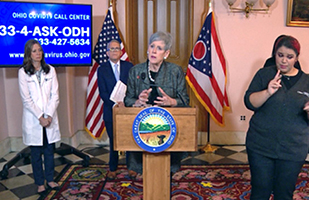Chief Justice O’Connor Addresses Virus Issues; Expands Court Tech Grants to Fight Crisis

Ohio Supreme Court Chief Justice Maureen O’Connor addresses the public during the governor’s daily news conference on the coronavirus.

Ohio Supreme Court Chief Justice Maureen O’Connor addresses the public during the governor’s daily news conference on the coronavirus.
Chief Justice Maureen O’Connor declared today that the Ohio Supreme Court will offer $4 million in grants from its budget to help local courts use technology to deal with the coronavirus crisis.
“It is my hope that by pushing out this funding on an emergency basis we can assist the local courts with a quick implementation of video conferencing for arraignments and other conferencing needs,” Chief Justice O’Connor said.
The decision was made on behalf of local courts across the state that lack the equipment and resources to facilitate the Chief Justice’s desire of continual operation by the courts while observing health guidelines on minimizing social interactions.
The announcement was made during the daily news briefing on the crisis held by Gov. Mike DeWine and broadcast and live-streamed statewide.
“This is an unprecedented time, a time during which the judiciary of Ohio as well as the bar, and state and local leaders must come together to guarantee the vital, continued operation of the state’s judicial system and the public’s access to its courts,” the Chief Justice said.
The new grants are tied to the current emergency and are in addition to the annual round of tech grants that the Chief Justice launched five years ago. Those grants have totaled more than $17 million and have covered a wide range of modern upgrades around the state.
Ohio has 353 autonomous courts, and the Chief Justice has been in contact with judges and judiciary stakeholders about keeping courts active while reducing potential public health risks.
“Total closure of the courts and the clerks of court offices presents an access-to-justice issue,” she told the news conference. “Measures can be taken to ensure access to justice, while safeguarding the health of employees. By limiting but not eliminating access, the courts can be closed to the public for non-essential purposes.
“I've asked judges to prioritize their workload, to reduce the need for jury pools and the level of public traffic in courthouses. I encourage them to maximize technology and modify their orders to reduce the need for face-to-face interaction. I urge them to consider lowering bonds and using summonses instead of arrests to help minimize jail populations.”
Courts and law enforcement also could minimize jail populations by lowering bonds and assessing inmates that may be vulnerable for infection.
“I urge judges to use their discretion to release people held in jail and release incarcerated individuals who are in a high-risk category for being infected with the virus,” Chief Justice O’Connor said.
Like the local courts, staff at the Supreme Court continues to work as it accepts case filings and provides support to judges, court personnel, and attorneys.
Understanding the evolution of the pandemic, the Chief Justice says she’ll remain connected throughout the state to address any alterations that may come, saying: “We are working together in this ever-changing environment, and we are pleased to continue to do so.”
Acrobat Reader is a trademark of Adobe Systems Incorporated.


